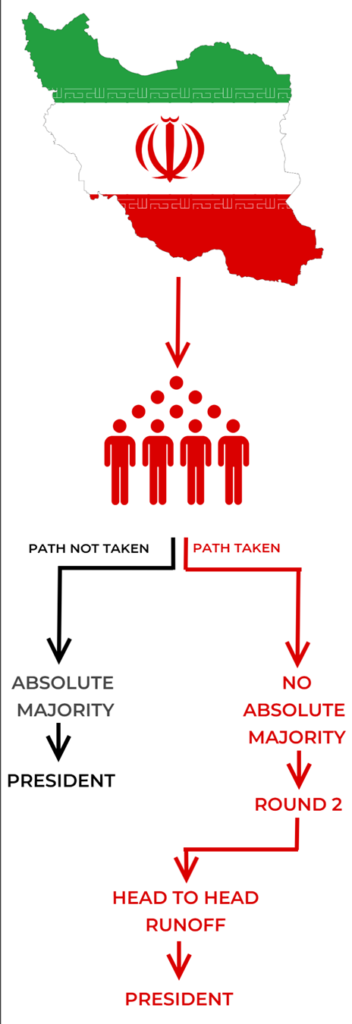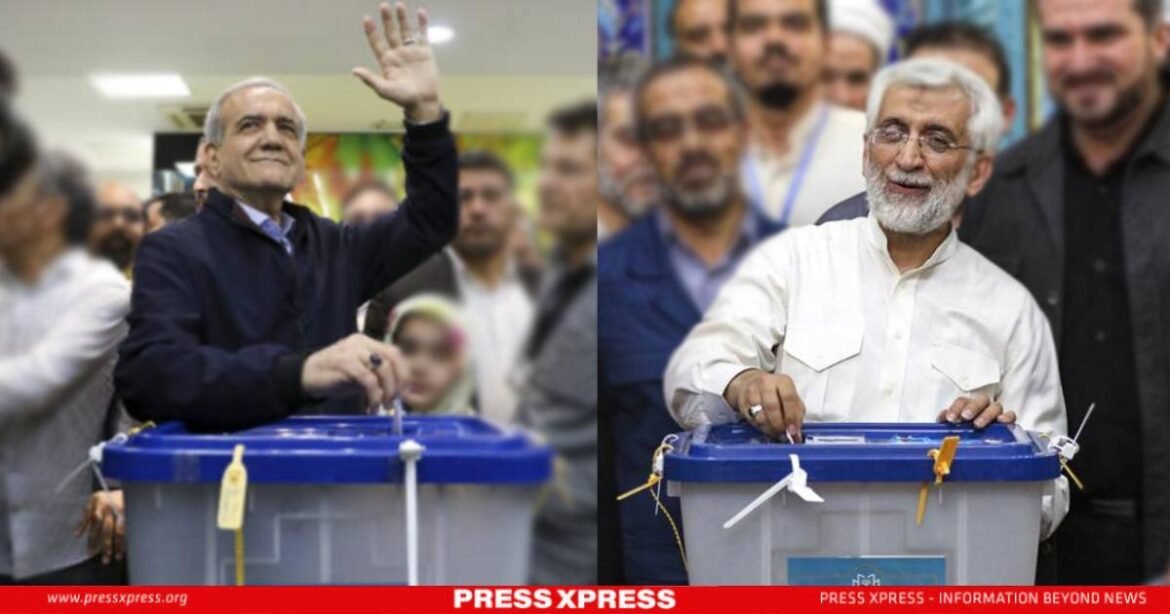The sudden death of President Ebrahim Raisi in a helicopter crash has thrust Iran into an unexpected election. This snap election, aimed at choosing Raisi’s successor, has captured the attention of over 61 million eligible voters, including a substantial youth demographic aged 18 to 30.
You can also read: UK Election Live: UK Braces for a Final Political Shift today
The election is taking place against a backdrop of declining voter participation and widespread discontent with the government. Previous elections have seen a steady drop in turnout, reflecting growing frustration with the political system. Both conservative and reformist candidates are vying for the presidency, each presenting distinct visions for Iran’s future.
Snapshot of the Snap Election

The unexpected presidential election on June 28, 2024, follows President Raisi’s untimely demise. Only six candidates received approval to run from an initial pool of 80 registrants, including five hardliners and one reformist. The voter turnout reached a historic low of around 24.4 million, the smallest since 1979, reflecting public dissatisfaction and calls for a boycott.
The race has narrowed to two key contenders: reformist Masoud Pezeshkian and conservative Saeed Jalili. Pezeshkian secured 10.4 million votes, while Jalili received approximately 9.5 million, necessitating a runoff election scheduled for July 5. The election’s low turnout and competitive nature underscore the political tension and the public’s desire for change.
Reformist Candidate’s Vision
Masoud Pezeshkian, the reformist candidate, promises substantial changes for Iran. His platform includes reviving the 2015 nuclear deal and lifting sanctions to boost Iran’s economy. Pezeshkian advocates for increased internet freedoms and reducing restrictions on social media platforms like Facebook and Instagram. He also supports enhancing women’s rights and has been critical of the morality police’s actions.
Pezeshkian has garnered support from key reformist figures, including former President Mohammad Khatami and ex-Foreign Minister Mohammad Javad Zarif. His vision encompasses fostering improved relations with Western countries and promoting economic and social reforms to address public discontent. Pezeshkian emphasizes transparency and accountability, aiming to combat corruption and improve governance.

Conservative Candidate’s Vision
Saeed Jalili, a staunch conservative, aims to continue Ebrahim Raisi’s policies. He supports a “neighborhood” foreign policy that focuses on strong regional ties. Jalili advocates for Iran’s independence from Western influence and rejects renegotiating the nuclear deal. His priorities include promoting Iran’s self-reliance and domestic capabilities over foreign negotiations.
Jalili’s economic plan centers on the seventh five-year development plan, which includes measures to curb inflation, optimize the state budget and reduce government debt. Known for his hardline stance, Jalili maintains that Iran’s challenges stem from Western actions rather than domestic policies. His close ties with Supreme Leader Khamenei strengthened his influence within Iran’s political landscape.
Supreme Leader’s Dominance in Foreign Policy
Supreme Leader Ali Khamenei holds ultimate authority in Iran, a position established in the country’s constitution. This grants him extensive control over national, military, and foreign affairs. Khamenei’s influence extends to appointing key officials, including military chiefs and heads of the Islamic Revolutionary Guard Corps (IRGC).
Khamenei’s approach to foreign policy demonstrates a blend of ideological adherence and pragmatism. While upholding revolutionary principles, he shows flexibility when necessary, exemplified by his support for the 2015 nuclear deal under President Hassan Rouhani. This “heroic flexibility” allows Iran to engage with adversaries like the U.S. when it serves national interests.
The president, while holding significant domestic power, operates under Khamenei’s oversight. This structure limits the president’s ability to make independent decisions on foreign policy, ensuring continuity in Iran’s strategic direction regardless of electoral outcomes.
US and Russia’s Potential Reactions
Both the United States and Russia are closely monitoring Iran’s presidential election, as the outcome could affect their strategic interests in the region. If reformist Masoud Pezeshkian wins, the U.S. may see an opportunity to renegotiate the nuclear deal and ease tensions. This aligns with President Biden’s approach to engage diplomatically and prevent a crisis before the November U.S. elections.
Conversely, a victory for hardliner Saeed Jalili would likely result in continued hostility and reduced chances for dialogue. Jalili’s opposition to the nuclear deal and closer ties with Russia and China pose challenges for U.S. foreign policy.
Russia favors stability and continued cooperation with Iran. A Jalili victory would ensure strong bilateral relations, especially in military and economic domains. If Pezeshkian wins, Russia might face a more balanced approach from Iran, potentially reducing the depth of their cooperation. However, Russia remains prepared to maintain its strategic partnership regardless of the election outcome, focusing on common interests like energy and regional security.
Iran’s Future
Iran’s future foreign policy under a new president will likely see more continuity than change. Supreme Leader Ali Khamenei’s ultimate authority means that any president, whether reformist or conservative, will have a limited impact on core policies.
If Pezeshkian wins, he might push for renewed negotiations on the nuclear deal, aiming to ease sanctions and improve Iran’s economy. However, any significant shifts will still require Khamenei’s approval. A victory for Jalili will likely mean a continuation of Iran’s current hardline stance, emphasizing self-reliance and regional alliances with China and Russia.
While the new president may influence domestic policies, foreign policy will remain under Khamenei’s control. The broader direction of Iran’s engagement with the world will thus see little alteration, maintaining a focus on strategic interests defined by the Supreme Leader and the IRGC.


